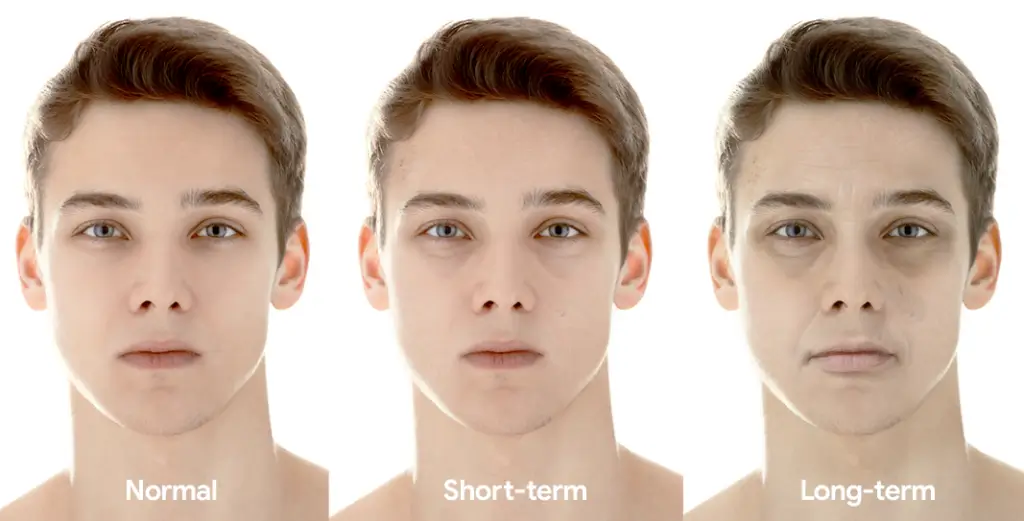
It is important to understand that sleep plays a central role in all your health, I believe it is the basis, since your proper rest depends on how much energy you have during the day and how you feel.
The better your quality of sleep, the better your mood, the more willpower you will have, the more efficient your metabolism, the more fat you burn and the more muscle you generate, and all this because tissue repair happens when we are asleep.
Sleep is also a cognitive enhancer.
Lack of sleep slows metabolism, increases blood pressure, increases ghrelin (hunger hormone), causes insulin resistance and increases cortisol.
THE BEST HABIT
Go to sleep as close to 10 pm as you can.
Improving overall sleep quality is incredibly helpful for mood, focus, energy levels and overall health, but if I had to choose what improved my sleep the most, it has to be this.
Did you ever get a reasonable 7, 9 hours of sleep and wake up feeling groggy and tired?
This is due to circadian rhythms.

Your body operates on a biological clock that dictates many physiological processes.
We have a daily dose of cortisol in the morning to wake us up and a surge of melatonin at night to put us to sleep. If you can act in sync with this rhythm, falling asleep and getting quality sleep is much easier.
What our body would prefer us to do is to fall asleep a few hours after sunset. This differs depending on where you are in the world, but for most people it is around 10 pm.
The potent anti-cancer and antioxidant melatonin as well as the restorative “youth hormone” -Human Growth Hormone - are secreted in their strongest doses between 10 pm and 2 am.
As neurologist Kulreet Chaudhary says, “if your body is chronically deprived of regenerative sleep between 10:00 p.m. and 2:00 a.m., you may still feel fatigued when you wake up in the morning.”
I found that falling asleep around 10 p.m. is always better. For example, if I sleep six hours but from 10 p.m. to 4 a.m., I'm going to feel much better than if I sleep eight hours but from 1 a.m. to 9 a.m.
What happens if you don't get enough sleep?
Several studies on prolonged sleep deprivation also suggest disruptions in skin barrier function. Rats subjected to prolonged periods of sleep loss in one study developed ulcerative lesions on their paws and tails, and susceptibility to bacterial infections.
https://www.mdedge.com/obgyn/articl...ology/beauty-sleep-sleep-deprivation-and-skin
People are less inclined to socialize with people who “appeared to be sleepy.”
https://www.ncbi. nlm.nih.gov/pmc/articles/PMC5451790/
Study showing effects just after 1 week of sleep reduction. Testosterone levels decreased by 10-15% in healthy young men.
https://www.ncbi.nlm.nih.gov/pmc/articles/PMC4445839/
Effect of sleep deprivation on cognitive performance.
https://www.ncbi.nlm.nih.gov/pmc/articles/PMC2656292/
Sleep deprivation triggers immune system to act as if under physical stress
https://www.sleepfoundation.org/art...-effect-immune-system-mirrors-physical-stress
Lack of sleep kills libido and causes erectile dysfunction
https:// www.jsm.jsexmed.org/article/S1743-6095(19)30006-2/fulltext
Japanese workers who went to bed later showed more depressive symptoms than those who went to bed earlier
https://www.ncbi.nlm.nih.gov/pubmed/24162148

Practicing good sleep hygiene
For optimal rest, it is best to follow the body's natural circadian clock. 8 hours of sleep is the standard recommendation - from 10:00 pm to 6:00 am - is the best time to sleep and wake up for most people. Obviously it's not possible for everyone, but we have to keep it in mind.- Sleep respecting your circadian cycles from 22:00 to 6:00 or 23:00 to 07:00 hours.
- Waking up every day at the same time, 7 days a week will help you regulate your circadian cycles and make it easier for you to sleep later.
- Sleep in a completely dark room (it has to look like a cave).
- Do not use the cell phone 1h before going to sleep or use a blue light filter.
- Do not drink coffee, mate or tea after 14:00 hours.
- Have dinner at least 2 hours before going to bed.
- Sun exposure in the morning, as early as possible, is key.
